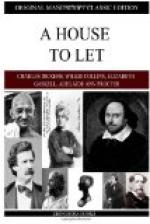The subject on which the person in question had ventured, for the first time in his life, to form an opinion purely and entirely his own, was one which had already excited the interest of his respected mistress in a very extraordinary degree. Or, to put it in plainer terms still, the subject was no other than the mystery of the empty House.
Feeling no sort of objection to set a success of his own, if possible, side by side with a failure of Mr. Jarber’s, Trottle made up his mind, one Monday evening, to try what he could do, on his own account, towards clearing up the mystery of the empty House. Carefully dismissing from his mind all nonsensical notions of former tenants and their histories, and keeping the one point in view steadily before him, he started to reach it in the shortest way, by walking straight up to the House, and bringing himself face to face with the first person in it who opened the door to him.
It was getting towards dark, on Monday evening, the thirteenth of the month, when Trottle first set foot on the steps of the House. When he knocked at the door, he knew nothing of the matter which he was about to investigate, except that the landlord was an elderly widower of good fortune, and that his name was Forley. A small beginning enough for a man to start from, certainly!
On dropping the knocker, his first proceeding was to look down cautiously out of the corner of his right eye, for any results which might show themselves at the kitchen-window. There appeared at it immediately the figure of a woman, who looked up inquisitively at the stranger on the steps, left the window in a hurry, and came back to it with an open letter in her hand, which she held up to the fading light. After looking over the letter hastily for a moment or so, the woman disappeared once more.
Trottle next heard footsteps shuffling and scraping along the bare hall of the house. On a sudden they ceased, and the sound of two voices—a shrill persuading voice and a gruff resisting voice—confusedly reached his ears. After a while, the voices left off speaking—a chain was undone, a bolt drawn back—the door opened—and Trottle stood face to face with two persons, a woman in advance, and a man behind her, leaning back flat against the wall.
“Wish you good evening, sir,” says the woman, in such a sudden way, and in such a cracked voice, that it was quite startling to hear her. “Chilly weather, ain’t it, sir? Please to walk in. You come from good Mr. Forley, don’t you, sir?”
“Don’t you, sir?” chimes in the man hoarsely, making a sort of gruff echo of himself, and chuckling after it, as if he thought he had made a joke.
If Trottle had said, “No,” the door would have been probably closed in his face. Therefore, he took circumstances as he found them, and boldly ran all the risk, whatever it might be, of saying, “Yes.”




